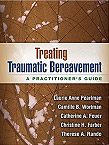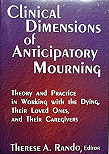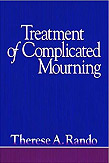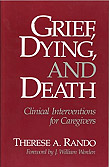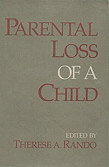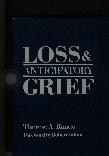Clinical Psychologist - Traumatologist - Thanatologist
The Institute for the Study and Treatment of Loss
and
Therese A. Rando Associates, Ltd.
Books
|
COMING SOON! Coping With the Sudden Death of Your Loved One: A Self-Help Handbook for Traumatic BereavementThis book focuses on guidance for the traumatized mourner, where that person’s grief over a death is complicated by traumatic stress associated with that loss. As well, it gives substantial new information counselors can use. The book specifies self-help strategies for mourners losing loved ones to sudden death, such as from accident, disaster, suicide, homicide, terrorism or war, and acute natural death (as from acute medical events like heart attack or stroke or acute medical illness like COVID-19 or bacterial meningitis). The book provides cutting-edge information and self-help strategies for dealing with the unique challenges posed by the volatile mixture of trauma and loss in a death that is unexpected. In addition to exploring the particular experiences associated with each type of sudden death, the reader is helped to construct their own self-help plan. Detailed attention is paid to how to think and feel in healthy ways, how to cope effectively, how to enable healthy mourning, how to manage anxiety, how to handle depression, and how to pay attention to other sudden death repercussions (such as avoidance, reexperiencing, anger, guilt, loss of meaning, and unfinished business and unanswered questions). Specific guidance is provided for grappling with the loss of a child, dealing with other people and work, surviving the criminal and civil justice systems, looking for assistance and support, and creating personal bereavement rituals. Throughout the book, emphasis is placed on practical suggestions for what the mourner can do to understand, respond to, and cope with the sudden death of their loved one. |
|
Treating Traumatic Bereavement: A Practitioner's GuideWinner (Second Place)—The American Journal of Nursing Book of the Year Award, Psychiatric and Mental Health Nursing Category Pearlman, L.A., Wortman, C.B., Feuer, C.A., Farber, C.H, and Rando, T.A. Guilford Publications, 370 Seventh Avenue, Suite 1200, New York, NY 10001-1020 USA Phone: 800-365-7006 E-mail: orders@guilford.com Website: www.guilford.com This book presents an integrated treatment approach for those struggling to adapt after the sudden, traumatic death of a loved one. The authors weave together evidence-based clinical strategies grounded in cutting-edge knowledge about both trauma and grief individually, as well as the unique challenges created when they coincide. The book offers a clear framework and many practical tools for addressing the three core components of its treatment: building a survivor's internal and interpersonal resources (through addressing self-capacities, coping skills, social support, bereavement-specific strategies, meaning and spirituality, and values and personal goal setting); processing the traumatic death both cognitively and emotionally; and facilitating the processes of mourning. Illustrated with rich case vignettes, and providing in-depth examples of clinical integration that is illustrated by detailed descriptions of therapist and survivor conversations, this book is focused on providing specific and practical guidance to practitioners. Treatment challenges are discussed and guidelines are provided for how to manage them. Printed in a large-size format with lay-flat binding for easy photocopying, the book includes over 30 reproducible handouts to use in treatment. Purchasers can access a companion website to download and print these materials, as well as supplemental handouts and a sample 25-session treatment plan. (358 pages) |
|
Clinical Dimensions of Anticipatory Mourning: Theory and Practice in Working with The Dying, Their Loved Ones, and Their CaregiversAvailable through The Institute for the Study and Treatment of Loss, 33 College Hill Road, Bldg. 30A, Warwick, RI 02886 USA Phone: 401-823-5410 E-mail: tarando@cox.net Website: www.thereserando.com This edited book critically examines the experience of anticipatory mourning in life-threatening and terminal illness from the perspectives of the life-threatened or dying person, their loved ones, and their caregivers. New work expands the conceptualization of anticipatory mourning, providing operationalization of the phenomenon in six dimensions. There is novel incorporation into anticipatory mourning of the clinical concepts regarding coping, traumatic stress, tasks of dying, transitions to coping in absence, fading away, appropriate death, therapeutic denial, and the re-creation of meaning in illness, among many other topics. Specific, practical intervention strategies are offered for those working with anticipatory mourners contending with prenatal diagnosis; chronic disability of a child; HIV/AIDS; Alzheimers, ALS, and irreversible coma; organ donation; advance directives; and death of a companion animal. Emphasis is placed on clinically-relevant intervention techniques to enable healthy anticipatory mourning. (601 pages) |
|
Treatment of Complicated MourningResearch Press, P.O. Box 7886, Champaign, IL 61826 USA Phone: 800-519-2707 E-mail: orders@researchpress.com Website: www.researchpress.com This was the first book to focus specifically on complicated mourning - often referred to as pathological, unresolved, or abnormal grief - and to delineate the therapeutic strategies and techniques necessary when mere grief facilitation is insufficient. It is a thorough and comprehensive resource, both compiling the theoretical and clinical literature and explicating the necessary processes for successful prediction, identification, assessment, classification, and treatment. The book is clinically relevant and practical, including brand new material on: identification of the four forms complicated mourning may assume and a delineation of its specific symptoms, seven syndromes, and high-risk factors; philosophical perspectives on intervention and generic guidelines for treatment; interventions for complications in the six "R" processes of mourning and for major clinical problem areas such as guilt, ambivalence, and anger; association of complicated mourning with PTSD and with previous sexual abuse and victimization; new approaches to assessment, including a new clinical tool, the Grief and Mourning Status Interview and Inventory (GAMSII); a classification for subsequent temporary upsurges of grief (STUG) reactions; analysis of complicated mourning as related to DSM diagnostic categories; issues and therapeutic implications associated with death of a child, AIDS-related death, suicide, homicide, sudden death, multiple death, and traumatic death; and reasons for the significantly increasing prevalence of complicated mourning. (751 pages) |
|
How To Go On Living When Someone You Love DiesChosen all-time "Best Book About Dealing With Grief After a Death" by New York Magazine. Penguin Random House, 1745 Broadway, New York, NY 10019 USA Phone: 800-793-2665 E-mail: ecustomerservice@penguinrandomhouse.com Website: www.penguinrandomhouse.com This book was written specifically for the general public (although fifty percent of it is new for caregivers) to provide information and support to help individuals cope better with loss, and supplant the unrealistic expectations about mourning that make it harder than it has to be. Grief is depicted as being an intense and uniquely personal experience, with each loss posing its own distinct issues and having its own specific requirements for resolution. The book addresses the specific issues faced by those who lose a spouse, child, parent, sibling, or friend and it explains the unique needs of those whose loved ones die from accident, suicide, homicide, illness, or acute natural causes. It identifies the necessary processes to cope with grief successfully, defining what "recovery" will and will not mean and explaining how to keep the deceased loved one appropriately "alive" in memory, as well as how to deal with the changed identity and redefined roles and relationships that major loss necessarily brings. Additionally, this book provides a wealth of information to assist children in dealing with death, and addresses funeral rituals, anniversary reactions, and practical problems brought up by death. It offers a listing of organizational and book resources for the bereaved. (339 pages) |
|
Grief, Dying, and Death: Clinical Interventions for CaregiversResearch Press, P.O. Box 7886, Champaign, IL 61826 USA Phone: 800-519-2707 E-mail: orders@researchpress.com Website: www.researchpress.com Written for frontline caregivers working with the chronically ill, the dying, or the bereaved, this book is a synthesis of the research in the field of clinical thanatology and offers exhaustive lists and discussions of specific and practical treatment techniques, assessment tools, and interventions. Throughout the entire book, it employs individual, couple, and family perspectives. It delineates in depth the numerous experiences, reactions, concerns, fears, and needs of seriously ill and dying persons and of bereaved survivors, identifying the factors which influence them and the particular interventions which are therapeutic for them. In addition to these topics, it analyzes the different bereavement situations and treatment needs posed by specific types of losses, outlines the psychosocial aspects of funeral rituals, addresses the complex situation of the dying child, and explores the caregiver's concerns with ethical issues and the stress of working with the dying and bereaved. (477 pages) |
|
Parental Loss of a ChildAvailable through The Institute for the Study and Treatment of Loss, 33 College Hill Road, Bldg. 30A, Warwick, RI 02886 USA Phone: 401-823-5410 E-mail: tarando@cox.net Website: www.thereserando.com This edited book is devoted exclusively to analyzing the phenomenon of parental bereavement. It explores in depth the complex and unique issues and impacts of the death of a child occurring from pregnancy up through adulthood; discusses why parental bereavement is an exception to the general conceptualizations of mourning; outlines the subjective experiences of mothers, fathers, and siblings; and provides comprehensive new data on these special mourners. It also delineates clinical interventions and therapeutic support procedures that are practical and appropriate to intervention with bereaved parents, along with their surviving children. Other non-death losses of children are addressed as well. (555 pages) |
|
Loss and Anticipatory GriefAvailable through The Institute for the Study and Treatment of Loss, 33 College Hill Road, Bldg. 30A, Warwick, RI 02886 USA Phone: 401-823-5410 E-mail: tarando@cox.net Website: www.thereserando.com This edited book explicates the important component processes of anticipatory grief and delineates specific techniques designed to help with the painful, but critically necessary, processes of mourning in anticipation of the death of a loved one. It dispels many of the common myths about anticipatory grief and addresses the host of emotional, social, financial, physical, and practical concerns which plague those struggling to cope with an altered lifestyle and the stress of impending loss. The book focuses not only on the dying patient, but on children, family, and caregivers as well. (252 pages) |

